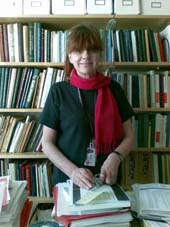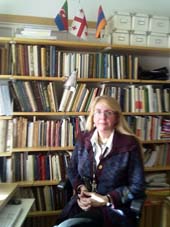Rising Awareness of the Caucasus within Swedish Academia
By Natalie Kereselidze
Monday, November 1


The course is structured to offer a one year online package (of different course modules) with two semesters: Caucasus studies one, and Caucasus studies two. The first part of the first semester includes an Introduction to Caucasus Studies as well as one of the Caucasus language courses offered by the University – either Georgian or Chechen (online). As for the second part of the first semester, it merges the courses of History of the Caucasus and Post-Soviet developments in the Caucasus. A second package consists of four course modules: State and Nation-Building of the Caucasus, Peoples and Languages of the Caucasus, The Caucasus Region- Causes and Consequences of Migration, and Conflict and Conflict Resolution in the Caucasus – a course that has been running since 2006.
The Caucasus Studies course will soon be extended to a year and a half programme. An additional course will be included, allowing students to write a BA thesis at the end of the programme. “We are still at Bachelor’s level, but we plan to take it to the Master level as well,” said Marta-Lisa Magnusson. Both the expansion of this module, and the rising aspiration of students to observe and discover more about the region show how its significance has altered among western countries, compared to previous years. The fact that Malmo University includes such a programme is in itself interesting and leads us to ask why it was incorporated in the school curriculum. One might assume the August 2008 war between Russia and Georgia had an influence, but the Caucasus courses were created back in 2006. Nevertheless, according to Karina Vamling, “There has certainly been a rising interest in applicants after the conflict.”
The increasing interest in this region resulted in a similar growth of interest in the programme. During Soviet times, it was Moscow that was of primary importance to the outside world; the Caucasus had no real significance. However, after the dissolution of the USSR, the region gained importance internationally and attracted attention from outsiders as well as states acting as regional powers. To be more precise, it is safe to say that the US, Russia, Turkey and Iran, in their own ways, try to compete for influence in the Caucasus. “The geopolitical competition is what makes this region interesting,” states Marta-Lisa Magnusson. She adds, “The control and distribution of natural resources such as oil and gas through the Caspian Sea to Europe and global markets, as well as the will for economic power over the region.” Another reason why the region is of interest to the rest of the world is the process of state and nation building in its three, relatively new independent states (the pro-western Georgia, the pro-Russian Armenia and Azerbaijan, which manages to stay neutral). These countries all have unique characteristics and factors that determine their value to the world beyond their borders. Another reason why there is a growing interest and awareness of the region is the political conflicts in the Caucasus; namely, Abkhazia-South Ossetia, Nagorno-Karabakh (involving Armenia), and the Russia-Chechnya conflict. These conflicts generate internally displaced people as well as refugees; the latter being a great deal of international concern.
The founders of the programme argue that it is of vital importance for future diplomats, journalists, and those who have their minds set on careers with non-governmental organisations, international organisations, and/or global business structures, to be educated and comprehend the rudiments of the Caucasus region. “[…] we thus provide our students with tools to understand these conflicts,” notes Marta-Lisa Magnusson. When it comes to the promotion and popularisation of the Caucasus Studies programme, modern day media sources, such as Facebook and Youtube are used as vital tools. Email lists, academic publications, and the distribution of flyers around school campuses are other methods.
The Swedish government has recently approved legislation that introduces tuition fees for non EU/EEA citizens from autumn 2011, at all universities; however, since Caucasus Studies is a distance based programme, the benefit for students from non EU/EEA countries who choose to indulge in it, will be larger, due to its cost being reasonably low compared to courses taught on campus.
